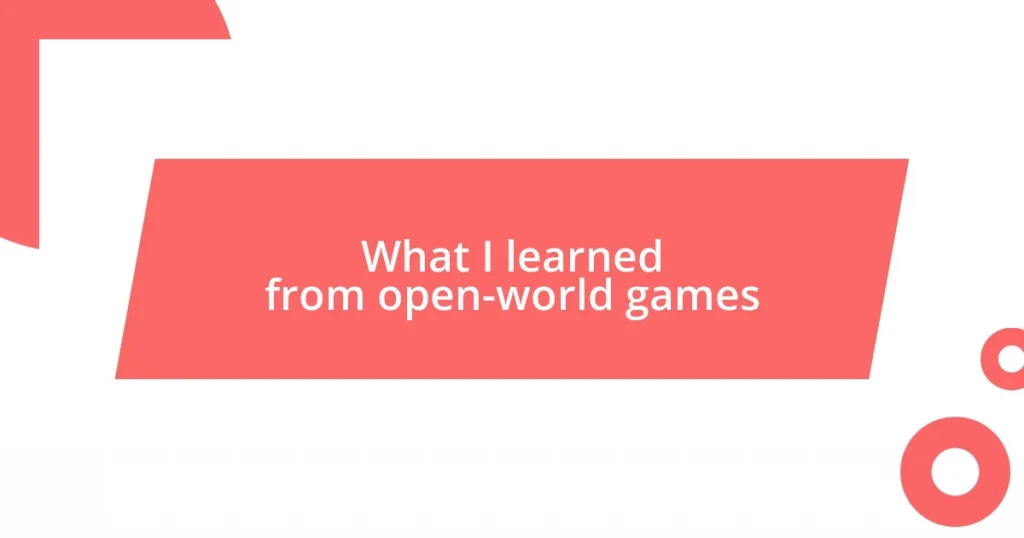Key takeaways:
- Open-world game design emphasizes exploration and player freedom, allowing for non-linear storytelling that creates a personal and immersive narrative experience.
- Emotional engagement stems from player choices, fostering a sense of agency and connection to characters within the game.
- Multiplayer ecosystems build community through shared experiences, reinforcing teamwork and emotional bonds among players.

Understanding open-world game design
Open-world game design is fascinating because it creates a living, breathing world that players can explore at their own pace. I remember playing “The Legend of Zelda: Breath of the Wild,” feeling that rush of excitement as I stumbled upon a hidden shrine while wandering off the beaten path. It made me wonder: how do designers capture that sense of discovery so seamlessly?
One of the keys to effective open-world design is balance. Designers must craft a massive landscape while ensuring players don’t feel lost or overwhelmed. I once got lost in “The Witcher 3,” which made me appreciate how thoughtful markers and engaging side quests pull players back into the fold. Isn’t it astounding how a carefully placed objective can spark your curiosity?
Moreover, the emotional engagement in open-world games stems from the choices we make. Each decision, whether rescuing a stranger or igniting a conflict, shapes our narrative. I find myself reflecting on how those interactions resonate long after gameplay ends. Have you ever considered why some choices leave you with a lingering sense of accomplishment or regret? Understanding these dynamics enriches the gameplay experience profoundly.

Key elements of player freedom
When diving into open-world games, the freedom to roam unrestricted creates a unique playground for players. I vividly remember wandering through the sprawling deserts of “Red Dead Redemption 2,” where each horse ride felt like a new adventure. I was always drawn to the quiet moments—like stopping to enjoy the sunset, interacting with random characters, or finding hidden treasures. Those small elements made me appreciate that player freedom is about choice and exploration.
Here are some key elements that contribute to the sense of player freedom in open-world games:
- Exploration: Players can discover diverse environments without restrictions, enhancing the thrill of uncovering hidden locations.
- Choice: The ability to make decisions that impact the game’s outcome provides a sense of agency and personal investment in the story.
- Non-linear progression: Players can engage in quests in any order, allowing them to shape their journey based on their preferences.
- Dynamic interactions: Engaging with NPCs and the environment offers unexpected surprises, making every gameplay unique.
- Customization: Tailoring characters and playstyles adds a personal touch, allowing players to express themselves in the game world.
Reflecting on my experiences, I find that these elements create an immersive environment that resonates deeply, enriching my interaction with the game. Navigating my own path also brings a sense of ownership to my adventures, something that stays with me long after I’ve set down the controller.
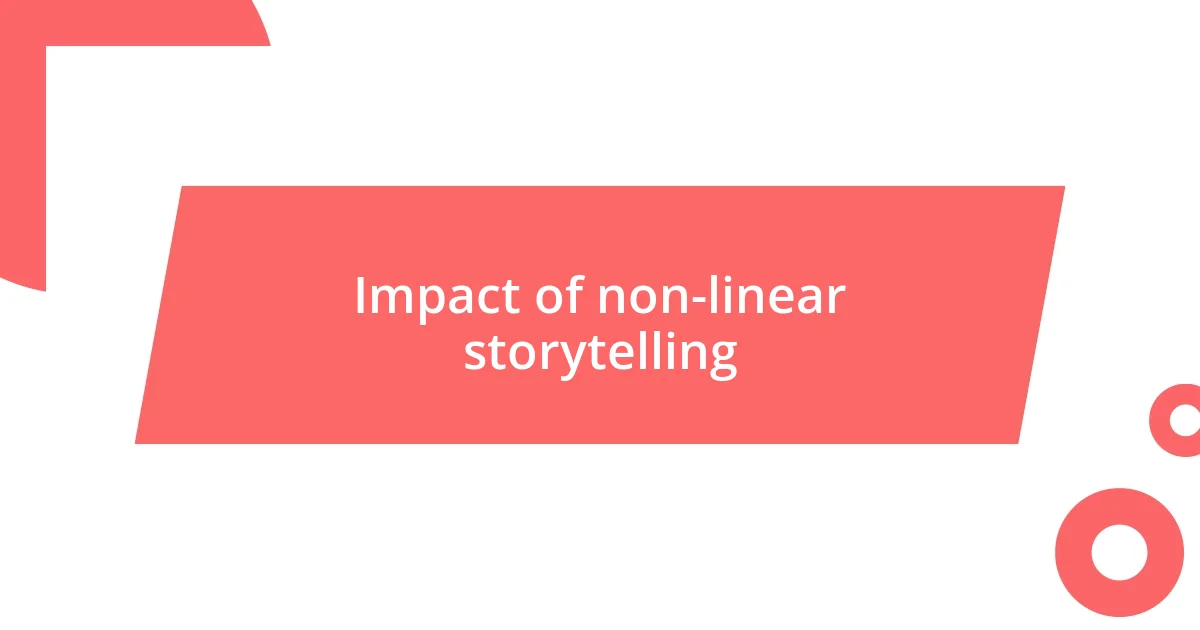
Impact of non-linear storytelling
Non-linear storytelling in open-world games has a profound impact on how we experience narratives. I recall the first time I played “Fallout: New Vegas”—every choice I made dictated not only the ending but also my relationships with characters. While I initially focused on the main quest, wandering off to help a side character led me down a entirely new path, teaching me that the story isn’t just linear—it’s a tapestry woven from countless individual threads shaped by player actions.
What strikes me deeply is the emotional depth that non-linear storytelling can provide. In “Mass Effect,” relationships with crew members evolve through player choices, and I felt a genuine connection to each character’s arc. The tension between my decisions and their consequences created a narrative that felt incredibly personal—like I was forging bonds that lingered well beyond the game itself. Isn’t it fascinating how some choices can make you feel proud, while others leave you questioning your moral compass?
| Aspect | Impact |
|---|---|
| Player Agency | Empowers players to shape the story through decisions, creating a sense of ownership. |
| Character Development | Offers deeper emotional connections as players’ choices affect character relationships and growth. |
| Replayability | Enhances the game’s longevity, inviting players to explore different outcomes and narratives. |
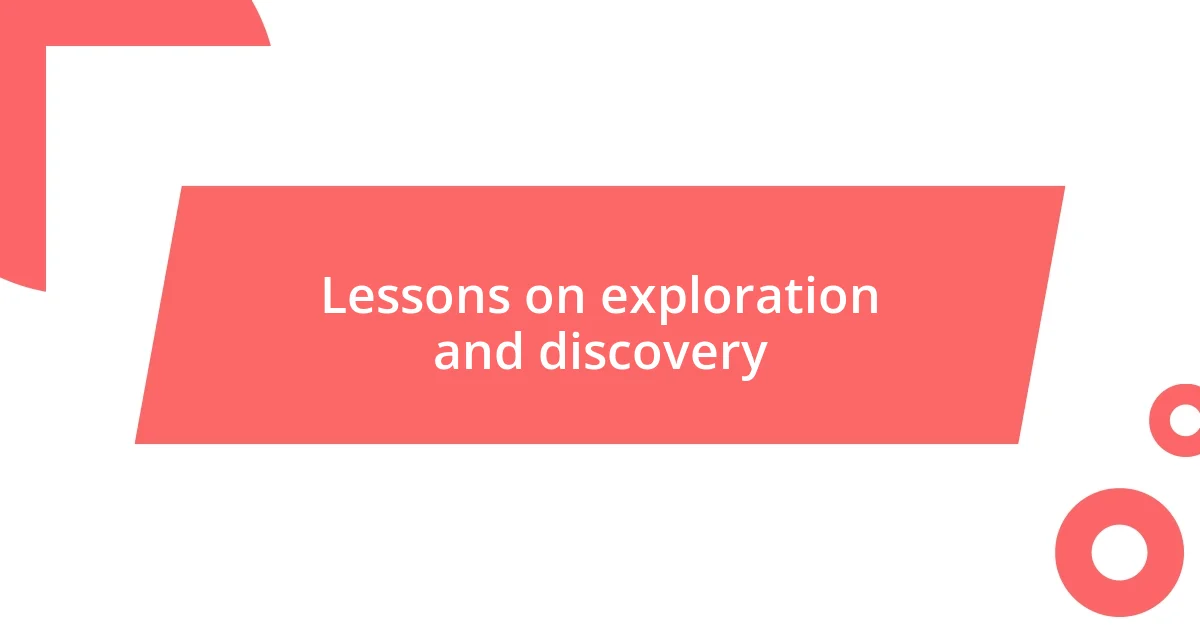
Lessons on exploration and discovery
Exploration in open-world games taught me the value of curiosity and attention to detail. During a session in “The Legend of Zelda: Breath of the Wild,” I stumbled upon a serene lake, completely off the beaten path. The unplanned exploration led me to a hidden shrine, which got me thinking: how often do we overlook the beauty in our real lives simply because we’re rushing to our next destination?
When I venture into new landscapes, I often feel a rush of exhilaration mixed with a bit of trepidation. In “Skyrim,” the snowy peaks called to me, encouraging my character to brave the wilderness. Each new discovery, from ancient ruins to unexpected encounters, made me realize that embracing the unknown often leads to rewarding experiences—whether within the game or in life.
These lessons extend beyond virtual realms. I’ve found that exploring new ideas and perspectives in my everyday life enriches my understanding and growth. So, why not take a metaphorical journey today? After all, the world is filled with hidden gems waiting to be discovered, just like in those vast digital landscapes.
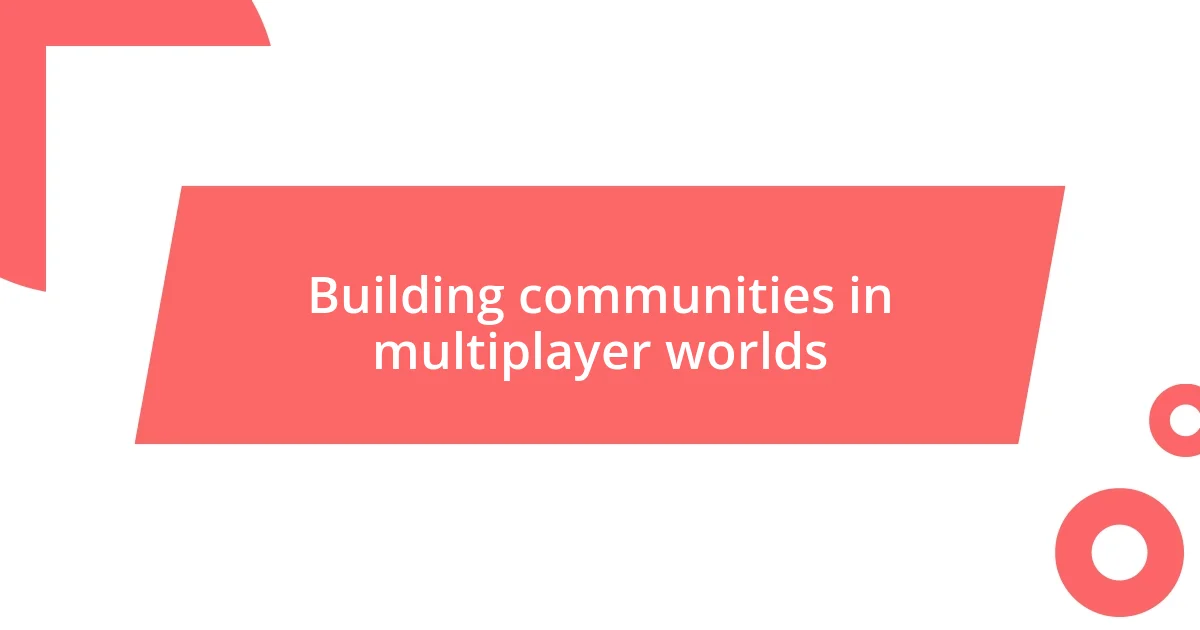
Building communities in multiplayer worlds
Building communities in multiplayer worlds is one of the most gratifying experiences I’ve encountered in gaming. I remember joining a guild in “World of Warcraft” during one of my late-night sessions. Suddenly, I wasn’t just a lone adventurer; I was part of a vibrant community. We shared victories, supported each other through defeats, and even formed friendships that transcended the game itself. Have you ever felt that sense of belonging that elevates gameplay into something more profound?
In my experience, the collaborative challenges in multiplayer environments often forge stronger bonds than any single-player adventure can offer. Whether it’s planning strategies for a raid in “Destiny 2” or simply chatting in a virtual tavern, these interactions create a rich tapestry of shared experiences. I’ve laughed over silly missteps, but I’ve also celebrated epic victories. It’s incredible how pixels on a screen can foster real emotional connection, isn’t it?
Moreover, I’ve seen communities in these games evolve and adapt, just like in real life. During a particularly tough dungeon run, members stepped up to support each other. It was a reminder that teamwork, empathy, and kindness matter, both in-game and beyond. These multiplayer worlds create unique opportunities for individuals from diverse backgrounds to come together, share goals and forge friendships that can last well after the credits roll.
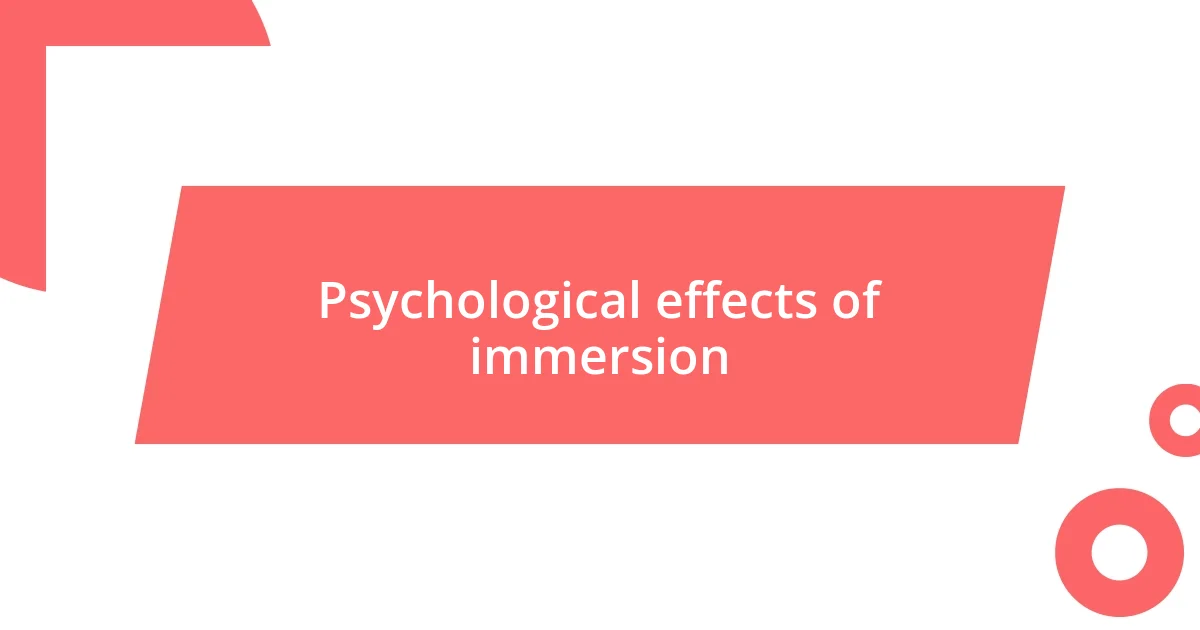
Psychological effects of immersion
Immersing myself in open-world games has revealed fascinating psychological effects. I still remember the first time I entered the vast landscapes of “Red Dead Redemption 2.” The rich detail and dynamic environment pulled me in so deeply that I forgot reality for hours. Have you ever experienced that mesmerizing feeling of being truly absorbed in a world? It’s like time stands still, leading to a temporary escape from everyday stress.
However, this level of immersion isn’t just about entertainment; it has real emotional implications. While trekking through the dense woods in “The Witcher 3,” I felt a wave of nostalgia wash over me, reminiscent of childhood adventures in the woods. It’s intriguing how a virtual space can evoke genuine emotions and memories, making us confront feelings we may not explore otherwise. I often wonder if this is a healthy form of escapism or if it sometimes serves as a coping mechanism.
It’s also interesting how immersion can foster empathy. In “Life is Strange,” the choices I made for the characters impacted me profoundly, teaching me about the weight of decisions and their effects on others. Moments like these make me reflect on my own choices in life. Isn’t it fascinating how video games can lead us to understand ourselves better, pushing us to grow in ways we may not initially recognize?










